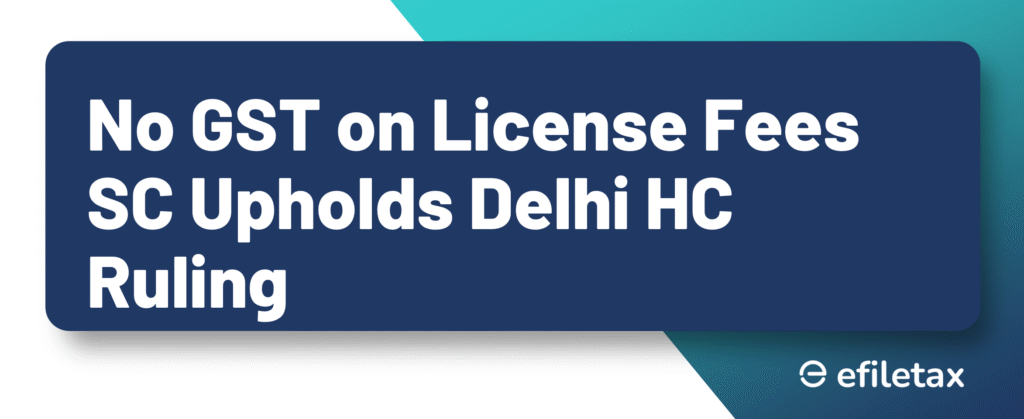
GST not applicable on license fee by electricity regulator
The Supreme Court has dismissed a Special Leave Petition (SLP) against the Delhi High Court’s landmark judgment, which held that GST is not applicable on license fees charged by Electricity Regulatory Commissions. This decision clarifies a long-standing confusion in the power sector and reaffirms the position that statutory fees are not “supply” under GST law.
What was the case about?
The Delhi Electricity Regulatory Commission (DERC) collects license fees from power companies as per the Electricity Act, 2003. The GST Department attempted to levy GST on such collections, treating it as a taxable supply of service.
DERC challenged this in the Delhi High Court, which ruled against the GST levy. The Department’s SLP was later dismissed by the Supreme Court in July 2024, thereby upholding the High Court’s decision.
Why GST is not applicable on license fee
Here’s a simplified breakdown:
| Basis | Why GST doesn’t apply on license fee |
|---|---|
| Statutory Nature | The fee is mandated by Section 14 of the Electricity Act, 2003 |
| Not a “supply” | It’s a regulatory obligation, not a service or business transaction |
| Non-commercial intent | Regulatory Commissions are not profit-making entities |
| Delhi HC observation | License fee is not consideration for any service |
| Supreme Court stance | Dismissed SLP without interference, reaffirming HC’s view |
Legal backing and case reference
- Electricity Act, 2003 – Section 14 & 181(2)(g): Authorises Regulatory Commissions to collect license fees
- GST Act – Section 7: Defines “supply”; excludes activities performed by a government/statutory body in sovereign capacity
- Delhi HC Ruling: Delhi Electricity Regulatory Commission vs Union of India (2023)
- SC Dismissal: SLP (C) Diary No. 38581/2023 dismissed in July 2024
Expert View: Tip for electricity sector and regulators
Any statutory fee charged in exercise of sovereign powers (like approvals, licenses, or penalties under sectoral laws) must be examined through this lens. If it lacks quid pro quo (direct service in exchange), GST may not apply. This ruling reinforces that.
Impact on other sectors
This ruling can influence similar disputes where regulatory bodies (like SEBI, TRAI, IRDAI) charge mandatory fees. Each must assess:
- Whether there’s a contractual service
- If the fee is in lieu of business activity
- Whether there’s “consideration” as per GST law
Practical takeaway for taxpayers
If you’re paying fees to a statutory regulator:
- Check whether it’s mandated under law
- Verify if the body is acting in sovereign capacity
- If yes, consult a tax advisor before treating it as a taxable supply
FAQ
Q1: Does this mean all government license fees are GST-exempt?
A: Not necessarily. Only those that are statutory and lack service quid pro quo.
Q2: Will GST already paid on license fee be refundable?
A: May be eligible if claimed within the time limit and supported by ruling.
Q3: Can this be cited in other GST disputes?
A: Yes, especially for statutory bodies and government authorities.
Conclusion
The Supreme Court’s dismissal of the SLP marks a crucial victory for statutory regulators like DERC. No GST on license fee collected under sovereign authority is now a reaffirmed legal position.
Need help assessing GST applicability on fees paid or collected by your organisation?
👉 Talk to Efiletax experts today and stay compliant with confidence.
Summary
Supreme Court confirms GST not applicable on license fees collected by Electricity Regulatory Commissions under Electricity Act. Statutory fee ≠ supply.